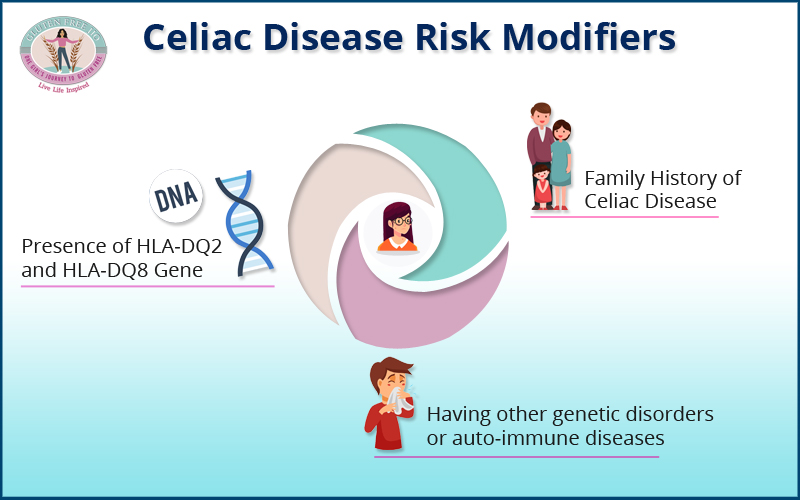Risk Modifiers for Celiac Disease

Celiac disease, also known as Coeliac disease, is a long-term auto-immune disorder affecting the small intestine. Upon ingestion of gluten, the villi in the small intestine of a person suffering from celiac disease get damaged. Thereby losing the ability to absorb any nutrients required for the well being of an individual. Celiac disease if left untreated may lead to osteoporosis, iron deficiency, neurological disorders, infertility, etc.
While extensive research is being done, the only known cure for celiac disease is a life-long gluten-free diet.
There is no consensus about what causes celiac disease. However, there are a mix of environmental and physical factors that increase the risk of contracting the disease.
Family History of Celiac Disease/genetic disorder
If you know someone in your family who has celiac disease, the risk of other family members suffering from celiac increases. Celiac disease is an auto-immune genetic disorder. As a matter of fact, if a close family member, for example, parents, siblings, or child, have celiac, the estimated risk of contracting celiac becomes 1 out of 22 for the other members. This risk becomes 1 in 39 if an extended family member, for example, aunt, uncle, or cousins, has celiac disease.
There is no universally agreed risk percentage of having celiac disease for family members of a patient, but most researchers put the risk at 1 in every 5 to 1 in every 10 other family members.
Having the HLA-DQ2 and HLA-DQ8 Gene
Also known as the celiac genes, the HLA-DQ2 genes have been found in 95% of people suffering from Celiac whereas the remaining 5% have the HLA-DQ8 gene. If you have either of these genes, it does not mean you have the disease also. In fact, it means that you are at a higher risk of contracting the celiac disease. Approximately one-third of the world’s population has these genes but not all of these people are Celiacs.
Having Other Genetic Disorders
The chances of contracting Celiac disease are higher among people who have other genetic disorders also. For example, if someone has Down’s syndrome they are at a higher risk of having Celiac disease.
Having Other Auto-immune Diseases
A person who has other auto-immune diseases is at a higher risk of developing Celiac disease . For example, patients having rheumatoid arthritis, Type 1 Diabetes, Addison’s disease are at a higher risk of becoming celiac.
Other Possible Factors Affecting Risk of Having Celiac Disease
Though there is more research to be done on this topic, some studies have shown that children younger than the age of 2 years who are born in Spring or summer have a lower chance of having celiac disease as compared to children born in winter and autumn.
Another study found out that if parents had three or more infection incidents in the first six months of the child’s infancy, the child was at an increased risk of having celiac disease.
In reality, little is known about celiac disease. There is not enough information on which factors or reasons cause it, what are the factors that increase risk, and what could help cure this. It is important to stay vigilant if your body gives you any alarming signals, or you may be suffering from any of the known 300 or more symptoms associated with the disease. Once diagnosed with celiac disease adopt a healthy gluten free diet since there is no other known medical recourse yet for it.
 MY JOURNEY
MY JOURNEY About Me
About Me Early life
Early life Diagnosis
Diagnosis CELIAC DISEASE
CELIAC DISEASE Symptoms & Diagnosis
Symptoms & Diagnosis Treatment & Follow Up
Treatment & Follow Up GLUTEN - FREE LIVING
GLUTEN - FREE LIVING At Home
At Home At School
At School At Social Events
At Social Events
 Grocery Shopping
Grocery Shopping COMMUNITY OUTREACH
COMMUNITY OUTREACH Gluten Free Meetup
Gluten Free Meetup Workshops
Workshops Webinars
Webinars COVID-19 Camps By Gluten Free Jio
COVID-19 Camps By Gluten Free Jio  Mid Day Meal
Mid Day Meal Beyond Celiac
Beyond Celiac Real Stories of Celiac
Real Stories of Celiac RESOURCES
RESOURCES Restaurant Dining Cards
Restaurant Dining Cards Recipes
Recipes Gluten Free eBook
Gluten Free eBook Gluten Free Jio App
Gluten Free Jio App RECOGNITION
RECOGNITION TRAVEL DIARY
TRAVEL DIARY



